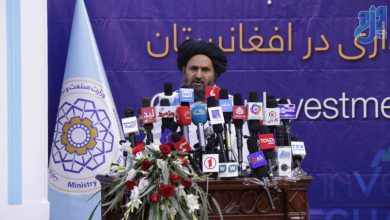The 50th Anniversary of Diplomatic Relations Between Afghanistan and China Celebrated

Weezha Roz-Today, the Ministry of Foreign Affairs of Afghanistan held a meeting at the White Palace to mark the 50th anniversary of diplomatic relations between Afghanistan and China.
The meeting was attended by Shir Mohammad Abbas Stanekzai, the Deputy Minister for Political Affairs of Afghanistan’s Ministry of Foreign Affairs, Mr. Zhao Xing, Ambassador of the People’s Republic of China, diplomats, officials from the Ministry of Foreign Affairs, university professors, students, and Afghan and Chinese businesspeople.
During the meeting, discussions focused on the level, significance, and historical developments of the diplomatic relations between Afghanistan and China.
The Ministry of Foreign Affairs of Afghanistan announced that the session also addressed increasing political, economic, and commercial cooperation between the two countries in the long term, as well as strengthening bilateral relations.
Relations between China andAfghanistan from a Diplomatic Perspective.
Diplomatic relations between China and Afghanistan have always been significant throughout history, although they have been influenced by regional and international political, economic, and security conditions.
However, in recent years, especially after the establishment of the Islamic Emirate of Afghanistan, the relationship between the two countries has been strengthened and reinforced in various aspects.
Key Points in Evaluating Diplomatic Relations Between China and Afghanistan:
1. Political Relations:
Political relations between China and Afghanistan have always been at a suitable level. China, as a major regional and global power, is interested in establishing strong relations with Afghanistan due to the country’s strategic geographic location, which can serve as a bridge between China and other countries in Central Asia and South Asia.
China has always emphasized its support for Afghanistan’s sovereignty and territorial integrity and is keen on ensuring political stability in the country.
2. Economic and Trade Cooperation:
In recent years, China has shown particular interest in Afghanistan, especially in the areas of economic and trade cooperation.
Through the “Belt and Road Initiative,” a major project for expanding infrastructure and transport networks worldwide, China is keen on investing in Afghanistan. China has initiated several projects in sectors such as mining, energy, infrastructure, and agriculture in Afghanistan.
Additionally, trade between the two countries is increasing, and Afghanistan is considered an important trade partner for China.
3. Security and Counter-Terrorism Cooperation:
China and Afghanistan also cooperate in security matters, particularly in the fight against terrorism and extremism.
China has concerns about the presence of terrorist groups along Afghanistan’s borders with Pakistan, which could pose a security threat to Central Asia and China.
Therefore, China is keen on collaborating with Afghanistan in addressing these security threats.
4. Humanitarian and Refugee Issues:
China has also collaborated with Afghanistan in the fields of humanitarian aid and refugee support.
During times of humanitarian crises and war, China has provided humanitarian assistance to Afghanistan and has invested in developmental projects.
China’s cooperation with Afghanistan in rebuilding and developing the country is highly significant.
5. Challenges and Obstacles:
Despite the positive aspects of diplomatic relations, challenges remain. The evolving security situation, especially related to terrorism and regional instability, continues to be a major concern.
Furthermore, there are issues regarding Afghanistan’s economic development and integration into global trade networks, which require sustained international support.
Summary:
Diplomatic relations between China and Afghanistan have been multifaceted and are likely to continue evolving.
Both countries have mutual interests in promoting peace, security, and economic development.
However, challenges such as security threats, the need for political stability, and infrastructure development remain important factors that will shape their future cooperation.
Weezha Roz




